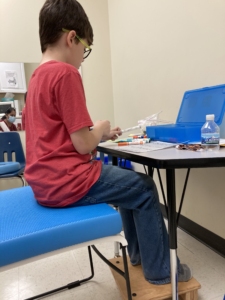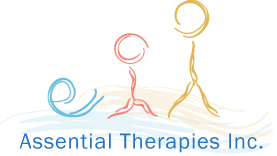 Once you schedule your occupational therapy evaluation, our front desk will email you a link to complete your initial paperwork. This paperwork includes your basic registration, Consent forms, HIPPA forms, and financial policy. The paperwork must be completed prior to your first visit. Additionally, please complete the Occupational Therapy Health History Form posted on our website. When you complete the health history form in detail prior to the session, the therapist is better able to prepare for your visit by choosing appropriate formal and informal assessment tools ahead of time.
Once you schedule your occupational therapy evaluation, our front desk will email you a link to complete your initial paperwork. This paperwork includes your basic registration, Consent forms, HIPPA forms, and financial policy. The paperwork must be completed prior to your first visit. Additionally, please complete the Occupational Therapy Health History Form posted on our website. When you complete the health history form in detail prior to the session, the therapist is better able to prepare for your visit by choosing appropriate formal and informal assessment tools ahead of time.
Plan on spending about an hour at our office for the OT evaluation. During your first appointment, the therapist will observe your child participating in a variety of “play” activities in our sensory motor gym in order to formally and informally assess his/her strengths and needs. During the assessment, occupational therapist evaluates:
- Sensory-Processing:
Sensory processing involves how our body interprets and responds to stimuli in our environment and its impact on our attention and emotions. The therapist evaluates your child’s ability to process information coming from all our senses including vision, hearing, smell, taste, touch, vestibular, and proprioception. Difficulty in sensory processing may lead to poor attention and/or self-regulation.
- Fine Motor Skills:
By definition fine motor skills include skills performed by smaller muscles in our body. Most of the activities performed by your hands fall into this category; e.g. reaching out and picking up a toy, putting things into a container, stacking blocks, stringing beads, holding a crayon or pencil, handwriting etc.
- Social Skills:
Social skills allow children to relate to peers and adults during interactions. This includes social competencies that guide us to socially attend, interpret people in context, problem solve how to respond, monitor how our behavior is being perceived, and adjust as needed to meet our own personal social goal(s) and/or the collective shared goal of the people in that context. Sensory processing is the foundational for development of appropriate social skills.
- Self-Help Skills and Daily Routines:
Here we look at grooming skills (e.g. brushing teeth, toileting, using utensils, dressing/undressing etc.), higher level skills such as managing school homework, and participation in daily household routines.
- Sleep:
Here we look at your child’s ability to fall asleep independently and stay asleep through the night.
At the end of the evaluation, your therapist will review her clinical impressions and make recommendations for future therapy visits. It takes time to score standardized tests, so your therapist will discuss the details of the findings during your following visit. At this time, you will be directed to the scheduler to schedule ongoing therapy appointments. Hopefully, this information will prepare you for your first visit. We look forward to helping you and your child.
